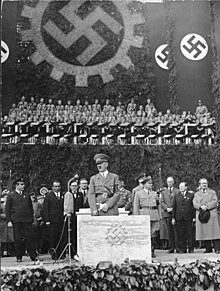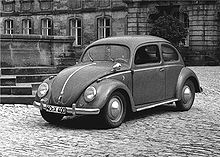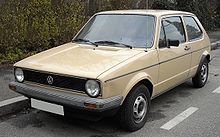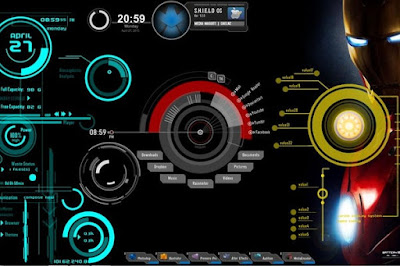Volkswagen Group
Volkswagen Group
Volkswagen AG (German: [ˈfɔlksˌvaːgn̩]),
known internationally as the Volkswagen Group, is a German multinational automotive manufacturing company
headquartered in Wolfsburg, Lower Saxony,
Germany and indirectly majority owned by Austrian Porsche and
Piëch families. It designs, manufactures and distributes passenger
and commercial vehicles, motorcycles, engines, and turbomachinery and offers
related services including financing, leasing and fleet management. In 2016, it
was the world's largest automaker by sales, overtaking Toyota and
keeping this title in 2017, 2018 and 2019 selling 10.9 million vehicles.[5] It has maintained the largest market
share in Europe for over two decades.[6] It ranked seventh in the 2018 Fortune Global 500 list of the world's
largest companies.[7] Volkswagen Group sells passenger cars
under the Audi, Bentley, Bugatti, Lamborghini, Porsche, SEAT, Škoda and
the flagship Volkswagen marques; motorcycles under the Ducati brand; and TRATON (commercial
vehicles, trucks, and buses) under the marques MAN, Scania,
and Volkswagen Commercial Vehicles. It is
divided into two primary divisions, the Automotive Division and the
Financial Services Division, and as of 2008 had approximately 342 subsidiary
companies.[8] Volkswagen also has two major
joint-ventures in China (FAW-Volkswagen and SAIC Volkswagen).
The company has operations in approximately 150 countries and operates 100
production facilities across 27 countries.
Volkswagen was founded in 1937, to
manufacture the car which would become known as the Beetle.
The company's production grew rapidly in the 1950s and 1960s, and in 1965 it
acquired Auto Union, which subsequently produced the first post-war
Audi models. Volkswagen launched a new generation of front-wheel drive vehicles
in the 1970s, including the Passat, Polo and Golf;
the latter became its bestseller. Volkswagen acquired a controlling stake in
SEAT in 1986, making it the first non-German marque of the company, and
acquired control of Škoda in 1994, of Bentley, Lamborghini and Bugatti in 1998,
Scania in 2008 and of Ducati, MAN and Porsche in 2012. The company's operations
in China have grown rapidly in the past decade with the country becoming its
largest market. In June 2018, Volkswagen Trucks and Buses which comprises the
MAN, Scania, and RIO truck brands are renamed to TRATON AG but the marques will
not change, said by Andreas Renschler.
History

26 May
1938: Laying the foundation stone of the first Volkswagen plant by Adolf Hitler. In the front right is Ferdinand Porsche.
1937 to 1945
Volkswagen ("People's car" in German) was founded on
28 May 1937 in Berlin as the Gesellschaft
zur Vorbereitung des Deutschen Volkswagens mbH ("Limited
Liability Company for the preparation of the German People's Car",
abbreviated to Gezuvor) by the National Socialist Deutsche Arbeitsfront (German
Labour Front). The purpose of the company was to manufacture the
Volkswagen car, originally referred to as the Porsche Type 60, then the
Volkswagen Type 1, and commonly called the Volkswagen Beetle. This vehicle was designed
by Ferdinand Porsche's
consulting firm, and the company was backed by the support of Adolf Hitler. On 16 September 1938, Gezuvor was
renamed Volkswagenwerk GmbH ("Volkswagen Factory
limited liability company").
Shortly after the factory near Fallersleben was completed, World War II started and the plant primarily
manufactured the military Kübelwagen (Porsche Type 82) and the related
amphibious Schwimmwagen (Type
166), both of which were derived from the Volkswagen. Only a small number of
Type 60 Volkswagens were made during this time. The Fallersleben plant also
manufactured the V-1 flying bomb,
making the plant a major bombing target for the Allied forces.
1945 to 1970

A
1951 Volkswagen Beetle
After the war in Europe, in June 1945, Major Ivan Hirst of the
British Army Royal Electrical and Mechanical Engineers (REME)
took control of the bomb-shattered factory, and restarted production, pending
the expected disposal of the plant as war reparations. However, no British car manufacturer
was interested; "the vehicle does not meet the fundamental technical
requirement of a motor-car ... it is quite unattractive to the average buyer
... To build the car commercially would be a completely uneconomic
enterprise". In 1948, the Ford Motor Company of
USA was offered Volkswagen, but Ernest Breech, a Ford executive vice president said
he didn't think either the plant or the car was "worth a damn". Breech
later said that he would have considered merging Ford of Germany and
Volkswagen, but after the war, ownership of the company was in such dispute
that nobody could possibly hope to be able to take it over. As part of
the Industrial plans for
Germany, large parts of German industry, including Volkswagen, were
to be dismantled. Total German car production was set at a maximum of 10% of
the 1936 car production numbers.The company survived by producing cars for the
British Army, and in 1948 the British Government handed the company back over
to the German state, and it was managed by former Opel chief Heinrich Nordhoff.
The Audi F103, in production from 1965 to 1972

Production of the Type 60 Volkswagen (re-designated Type 1)
started slowly after the war due to the need to rebuild the plant and because
of the lack of raw materials, but production grew rapidly in the 1950s and
1960s. The company began introducing new models based on the Type 1, all with
the same basic air-cooled, rear-engine, rear-drive platform. These included
the Volkswagen Type 2 in
1950, the Volkswagen Karmann Ghia in
1955, the Volkswagen Type 3 in
1961, the Volkswagen Type 4 in
1968, and the Volkswagen Type 181 in
1969.
In 1960, upon the flotation of part of the German federal
government's stake in the company on the German stock market, its name
became Volkswagenwerk Aktiengesellschaft (usually
abbreviated to Volkswagenwerk AG).
On 1 January 1965, Volkswagenwerk acquired Auto Union GmbH from its parent company Daimler-Benz. The new subsidiary went on to produce
the first post-war Audi models, the Audi F103 series, shortly afterwards.
Another German manufacturer, NSU Motorenwerke AG,
was merged into Auto Union on 26 August 1969, creating a new company, Audi NSU
Auto Union AG (later renamed AUDI AG in 1985).
1970 to 2000

A Volkswagen Golf Mk1;
the Golf is the third best-selling car of all-time, selling over 30 million up
to 2013
From the late 1970s to 1992, the acronym V.A.G was
used by Volkswagen AG as a brand for group-wide activities, such as
distribution and leasing. Contrary to popular belief, "V.A.G" had no
official meaning, and was never the name of the Volkswagen Group.
On 30 September 1982, Volkswagenwerk made its first step
expanding outside Germany by signing a co-operation agreement with the Spanish
car manufacturer SEAT, S.A.
In order to reflect the company's increasing global
diversification from its headquarters and main plant (the Volkswagenwerk in Wolfsburg), on 4 July 1985, the company name was
changed again – to Volkswagen Aktiengesellschaft (Volkswagen
AG).
On 18 June 1986, Volkswagen AG acquired a 51% controlling stake
in SEAT, making it the first non-German subsidiary of the Volkswagen Group. On
23 December the same year, it became the Spanish company's major shareholder by
increasing its share up to 75%.
In 1990 – after purchasing its entire equity –
Volkswagen AG took over the full ownership of SEAT, making the company a wholly
owned subsidiary, and on 28 March 1991 another step to the expansion of the
group's activities was made through the signing of a joint venture partnership
agreement with Škoda automobilová a.s. of Czechoslovakia, accompanied with the acquisition of a
30% stake in the Czech car manufacturer, raised later on 19 December 1994
to 60.3% and the year after, on 11 December 1995, to 70% of its shares.
Three prestige automotive marques were added to the Volkswagen
portfolio in 1998: Bentley, Lamborghini and Bugatti.
2000 to present

The Škoda Superb B6, in production from
2008-2015
On 30 May 2000, Volkswagen AG, after having gradually raised its
equity share, turned Škoda Auto into a wholly owned subsidiary.
From 2002 up to 2007, the Volkswagen Group's automotive division
was restructured so that two major Brand Groups with different profile would be
formed, the Audi Brand Group focused on more sporty
values – consisted of Audi, SEAT and Lamborghini – and the Volkswagen
Brand Group on the field of classic values – consisted of
Volkswagen, Skoda, Bentley and Bugatti – with each Brand Group's product
vehicles and performance being respectively under the higher responsibility of
Audi and Volkswagen brands.
Volkswagen Group revealed on 24 October 2009 that it had made an
offer to acquire long-time partner and German niche automotive
manufacturer Wilhelm Karmann GmbH out
of bankruptcy protection. In November 2009, the Supervisory Board of
Volkswagen AG approved the acquisition of assets of Karmann, and planned to
restart vehicle production at their Osnabrück plant in 2012.
In December 2009, Volkswagen AG bought a 49.9% stake in Dr. Ing. h.c. F. Porsche AG (more commonly known
as Porsche AG) in a first step towards an 'integrated automotive group' with
Porsche. The merger of
Volkswagen AG and Porsche SE was scheduled to take place during the course of
2011. On 8 September 2011, it was announced that the planned merger
"cannot be implemented within the time frame provided for in the
Comprehensive Agreement". As reasons, unquantifiable legal risks,
including a criminal probe into the holding's former management team were
given. Both parties "remain committed to the goal of creating an integrated
automotive group with Porsche and are convinced that this will take
place". On 4 July 2012 Volkswagen group announced they would wrap up
the remaining half of Porsche shares
for 4.46 billion euros ($5.58 billion) on 1 August 2012 to avoid taxes of as
much as 1.5 billion euros, which would have to be paid if the wrap up happened
after 31 July 2014. Volkswagen AG purchased the remaining stake in Porsche
AG equaling 100% of the shares in Porsche Zwischenholding GmbH, effectively
becoming its parent company as of 1 August 2012.
Volkswagen AG completed the purchase of 19.9% of Suzuki Motor
Corporation's issued shares on 15 January 2010. Suzuki invested part of
the amount received from Volkswagen into 1.49% percent of Volkswagen. In
2011, Suzuki filed a lawsuit at an arbitration court in London requesting that
Volkswagen return the 19.9% stake.
On 25 May 2010, it was announced that Volkswagen Group, through
it subsidiary Lamborghini Holding S.p.A., had acquired a 90.1% stake in the
Italian automotive design house Italdesign Giugiaro. In
less than three months, the transaction had been completed making the Italian
firm a member of the Volkswagen Group.
In 2015 research showed a security flaw in the keyless ignition
of Volkswagen and other carmakers' vehicles. Volkswagen spent two years trying
to keep the research from the public domain.
On 3 August 2015, Nokia announced
that it had reached a deal to sell its Here digital maps division to a consortium of
three German automakers—BMW, Daimler AG, and Volkswagen Group, for €2.8 billion. This
was seen as an indication that the automakers were interested in automated
cars.
Volkswagen held a 19.9% non-controlling shareholding in Suzuki between 2009 and 2015. An international
arbitration court ordered Volkswagen to sell the stake back to Suzuki. On
17 September 2015, Suzuki paid $3.8bn to complete the stock buy-back just hours
prior to a major scandal
about emissions violations engulfing Volkswagen. Suzuki had
wished to buy Fiat diesel engines.
Electrification strategy 2025

VW
Group has invested in a wide-ranging electrification strategy in Europe, North
America and China, with its electric
"MEB" platform
In 2016, Volkswagen Group announced a corporate "Strategy
2025" that focuses on electrification of its portfolio. The VW Group
developed the Volkswagen
Group MEB platform chassis that will be utilized in a range
various cars and light utility vehicles across several VW Group marques
due to its flexibility and floor-mounted battery.
As of May 2018, the VW Group has committed $48 billion in car battery supplies and
plans to outfit 16 factories to build electric cars by the end of 2022. According
to VW Group CEO Dr. Herbert Diess,
the company will offer 25 electric models and 20 plug-in hybrids by 2020.
Operations

Part of
the Volkswagen factory in Wolfsburg, Germany, its largest worldwide
Rooted in Europe, the Volkswagen Group operates in 153
countries. Volkswagen Passenger Cars is
the Group's original marque, and the other major subsidiaries include passenger car marques such
as Audi, Bentley, Bugatti, Lamborghini, Porsche, SEAT,
and Škoda.
Volkswagen AG also has operations in commercial vehicles,
owning Volkswagen
Commercial Vehicles, along with controlling stakes in truck, bus
and diesel engine manufacturers Scania AB and MAN SE.
Subsidiaries and brands
The Volkswagen Group comprises the following vehicle
manufacturers and their corresponding brands:
·
Audi
AG: 99.64% ownership; formed through the acquisitions of Auto Union from Daimler-Benz on 30 December 1964,
and NSU Motorenwerke on
9 March 1969 - Audi being the sole surviving marque from the Auto Union
combine. Audi Sport GmbH is
Audi's performance engineering and manufacturing subsidiary.
·
Automobili Lamborghini S.p.A.: 100% ownership. AUDI
AG acquired Lamborghini S.p.A. in September 1998.
Sponsorships
Volkswagen is
heavily involved in sports sponsorship, with investments having included
the 2008 Summer Olympics,
the 2014 Winter Olympics, as well as the David Beckham Academy. Volkswagen
AG wholly owns the Bundesliga football
side VfL Wolfsburg; the
company is also the shirt sponsor of Major League Soccer club D.C. United, League of Ireland Premier Division Sligo
Rovers and top level of the Mexican football league system Liga MX team Puebla F.C.
Porsche
headquarters in Stuttgart
·
Bentley Motors Ltd: 100% ownership by
Volkswagen AG. Volkswagen purchased Rolls-Royce & Bentley from Vickers
on 28 July 1998, however the purchase did not include the license to use
the Rolls-Royce trademark on automobiles, which is controlled by Rolls-Royce
Plc. BMW outmaneuvered Volkswagen, succeeding in obtaining the rights to
use the Rolls-Royce trademark on automobiles. From July 1998 until December
2002, BMW continued to supply engines for the Rolls-Royce Silver Seraph and the
Bentley division sold cars under both the Bentley and Rolls-Royce marques,
under an agreement with BMW.
·
Bugatti Automobiles
S.A.S.: 100% ownership. Bugatti Automobiles S.A.S. is a wholly
owned subsidiary of Groupe VOLKSWAGEN France s.a. Volkswagen acquired
Bugatti International S.A. Holding in July 1998.
·
Dr. Ing. h.c. F. Porsche AG: Volkswagen AG
purchased 49.9% of the shares in Porsche Zwischenholding GmbH (the holding
company of Porsche AG) in December 2009. Volkswagen
AG purchased the remaining stake in Porsche AG equaling 100% of the shares in
Porsche Zwischenholding GmbH, effectively becoming its parent company as of 1
August 2012.
·
Ducati Motor
Holding S.p.A.: 100% ownership by Automobili Lamborghini S.p.A.; company
was bought on 19 July 2012.
·
Jetta: Joint
venture with First Automotive
Works created in 2019.
·
MAN SE (controlling shareholder) Acquired
a controlling stake in July 2011, making MAN the 10th marque of the Volkswagen
Group. 94.36% ownership via TRATON SE since March 2019.
·
Scania AB: Acquired controlling stake in July
2008, making Scania the 9th marque of the Volkswagen Group. 100% ownership
since 15 January 2015 - shares held via TRATON SE.
·
SEAT,
S.A.: 100% ownership;] initially
in 1982 a co-operation agreement with AUDI AG; 51% and 75% ownership in 1986,
and full ownership in 1990. SEAT was the first non-German subsidiary of the
Volkswagen Group. Their high performance motorsport division SEAT Sport is renamed to CUPRA.
·
Škoda auto a.s.: 100% ownership. initially
in 1991 a co-operation agreement and 30% ownership; 60.3% and 70%
ownership on 1994 and 1995 respectively, 100% ownership since 2000
·
TRATON SE (formerly Volkswagen Truck and
Bus): 89.7% ownership. TRATON is the holding company for Volkswagen Group's
heavy commercial vehicle operations.
The
Volkswagen Commercial Vehicles assembly plant in Hannover, Germany
·
Volkswagen
Caminhões e Ônibus (VWCO): 100% ownership. Volkswagen's
Brazilian heavy truck and bus division. Sold by Volkswagen Group to MAN SE in
December 2008 and from that point also known as MAN Latin America. In November
2011, Volkswagen acquired a majority of the shares in MAN SE, bringing
Volkswagen Caminhões e Ônibus back into the group.
·
Volkswagen
Commercial Vehicles (VWCV), or German: Volkswagen
Nutzfahrzeuge (VWN): 100% ownership; Volkswagen's light commercial
vehicle division started operations as an independent entity in
1995.
·
Volkswagen Passenger Cars: the founding and
flagship marque of the company, 100% ownership.
The Group also owns five defunct marques which are managed
through the companies Auto Union GmbH and NSU GmbH, both of which are 100%
owned by AUDI AG:
·
Auto Union (the Auto Union company,
together with NSU Motorenwerke AG (NSU),
were merged into "Audi NSU Auto-Union AG" in 1969. The name was
shortened to "AUDI AG" in 1985, and the interlocked four-ring badge
from Auto Union is still used by AUDI AG).
·
Dampf-Kraft-Wagen (DKW)
·
Horch
·
NSU Motorenwerke AG (NSU) –
bought in 1969 by Volkswagen AG, and merged into "Audi NSU Auto-Union
AG"; the NSU brand has not been used since 1977, while the former NSU
manufacturing plant at Neckarsulm is
still used for Audi assembly. However, the current AUDI AG shares trade under
the ticker symbol "NSU".
·
Wanderer
Other subsidiaries and shareholdings:
·
MOIA, new mobility
services company, 100% ownership
·
MAN Energy Solutions 100%
ownership, the former power engineering division of MAN SE was purchased by
Volkswagen AG effective from 1 January 2019.
·
Renk AG 76% ownership, the shares
formerly held by MAN SE were purchased by Volkswagen AG effective from 1
January 2019.
·
IAV,
50% ownership
·
Navistar
International, 16.6% ownership since February 2017 - shares held by
TRATON SE.
This originally
appeared on Wikipedia.org
Uploaded by..Aman Mansuri
Department of Mechanical Engineering
TIH
team member
Email id.... theinnovationhub2019@gmail.com
"The innovation
hub" join us on following sites.....
You tube Channel
like...https://www.youtube.com/channel/UCma0poNdmpG6D959dLfeAEg
Twitter link.. https://mobile.twitter.com/TheInnovationH1
bike car updates Instagram link.. https://instagram.com/the_indian_autoblogger?igshid=h104bnrkdubx


👍
ReplyDelete👐
Delete